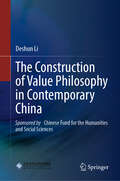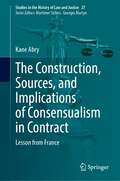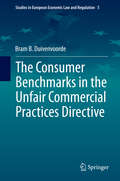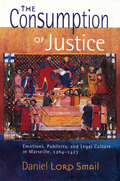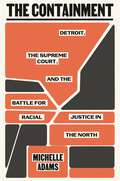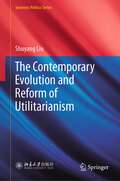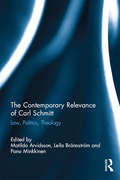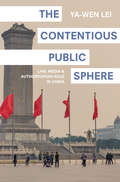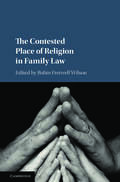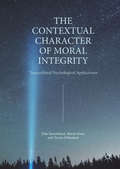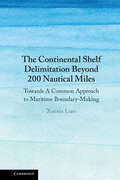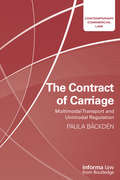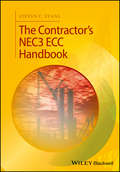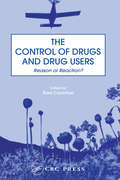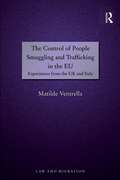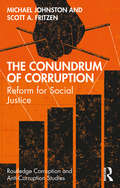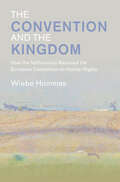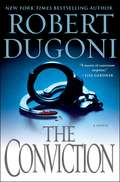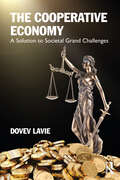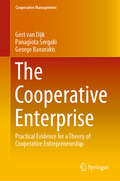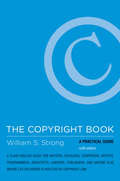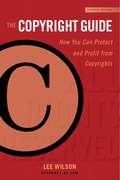- Table View
- List View
The Construction of Value Philosophy in Contemporary China
by Deshun LiThis book approaches humanism in the new era in China by discussing the nature of value philosophy and by analyzing in depth the significance of value research for China’s modernization and future development. The author expounds his own point of view on the value of human beings as the foundation of value philosophy and subsequently applies it to understanding conflicting values between China and the West, universal values, etc. In addition, he discusses the cultural value concept in China, e.g., the craze for traditional Chinese culture, value choices in socialism with Chinese characteristics, and Deng Xiaoping’s great practice. Combining the fields of academic study, political affairs, cultural communication, and social life, the book offers a valuable resource for scholars, researchers, politicians, diplomats, university students, and those who want to study and understand value philosophy, Chinese value research, and Chinese culture. In addition, it seeks to realize the value of human beings in culture. Lastly, its discussions on the value concept can facilitate understanding and respect among people(s) all over the world.
The Construction, Sources, and Implications of Consensualism in Contract: Lesson from France (Studies in the History of Law and Justice #27)
by Kane AbryThis book offers a comprehensive introduction to French contract law with a focus on the role of consent and the evolution of consensualism, considering its immediate historical sources. The book provides a clear, in-depth, and analytical discussion of the contingency of consensualism and how the development of consensual ideas across time and transnational geographical settings has specifically underpinned modern French contract law, which has inspired other legal systems and continues to do so. It also challenges the macro-narratives of European legal history and redefines consensualism so that it may be properly understood, addressing its manifest contemporary misinterpretations. Thorough, engaging, well-structured and inventive, there is no other English-language scholarly work that offers a similar analysis.“This monograph makes an evident contribution to the field by offering an original interpretation of several provisions in the Code Civil which relate to the law of contract. The author demonstrates an impressive grasp of Latin, French and English sources as well as knowledge of Roman law, legal history, and contemporary French law. It is well-referenced and offers an extensive bibliography”. – Dr Stephen Bogle, Senior Lecturer in Private Law, University of Glasgow, UK“The author brings a critical perspective to bear throughout the monograph and develops a clear and quite sophisticated position on the interaction between consensualism and formalism in Roman and French law and the intervening European ius commune”. – Prof Hector MacQueen, Emeritus Professor of Private Law, University of Edinburgh, UK
The Consumer Benchmarks in the Unfair Commercial Practices Directive
by Bram B. DuivenvoordeThis book investigates the regime of consumer benchmarks in the Unfair Commercial Practices Directive and explores to what extent this regime meets each of the goals of the Directive. In particular, it assesses whether the consumer benchmarks are suitable in terms of achieving the three goals of the Directive: achieving a high level of consumer protection, increasing the smooth functioning of the internal market, and improving competition in the market as such. In addition to providing a thorough analysis of the consumer benchmarks and their relationship to the goals of the Directive, at a more practical level, the book provides insight into the working and consequences of the benchmarks that can be used in the evaluation of the Unfair Commercial Practices Directive and its application by the CJEU. This assessment is important because the Directive, while promising to regulate unfair commercial practices in a way that achieves the Directive's goals, has removed the possibility for Member States to regulate unfair commercial practices themselves.
The Consumption Of Justice: Emotions, Publicity, and Legal Culture in Marseille, 1264–1423 (Conjunctions of Religion and Power in the Medieval Past)
by Daniel Lord SmailIn the thirteenth and fourteenth centuries, the ideas and practices of justice in Europe underwent significant change as procedures were transformed and criminal and civil caseloads grew apace. Drawing on the rich judicial records of Marseille from the years 1264 to 1423, especially records of civil litigation, this book approaches the courts of law from the perspective of the users of the courts (the consumers of justice) and explains why men and women chose to invest resources in the law. Daniel Lord Smail shows that the courts were quickly adopted as a public stage on which litigants could take revenge on their enemies. Even as the new legal system served the interest of royal or communal authority, it also provided the consumers of justice with a way to broadcast their hatreds and social sanctions to a wider audience and negotiate their own community standing in the process. The emotions that had driven bloodfeuds and other forms of customary vengeance thus never went away, and instead were fully incorporated into the new procedures.
The Containment: Detroit, the Supreme Court, and the Battle for Racial Justice in the North
by Michelle Adams"Splendid . . . Adams’s book explores class as well as race, with a richness and sophistication that recall J. Anthony Lukas’s 1985 masterpiece, Common Ground." —Jeffrey Toobin, The New York Times Book ReviewThe epic story of Detroit's struggle to integrate schools in its suburbs—and the defeat of desegregation in the North.In 1974, the Supreme Court issued a momentous decision: In the case of Milliken v. Bradley, the justices brought a halt to school desegregation across the North, and to the civil rights movement’s struggle for a truly equal education for all. How did this come about, and why? In The Containment, the esteemed legal scholar Michelle Adams tells the epic story of the struggle to integrate Detroit schools—and what happened when it collided with Nixon-appointed justices committed to a judicial counterrevolution. Adams chronicles the devoted activists who tried to uplift Detroit's students amid the upheavals of riots, Black power, and white flight—and how their efforts led to federal judge Stephen Roth’s landmark order to achieve racial balance by tearing down the walls separating the city and its suburbs. The “metropolitan remedy” could have remade the landscape of racial justice. Instead, the Supreme Court ruled that the suburbs could not be a part of the effort to integrate—and thus upheld the inequalities that remain in place today. Adams tells this story via compelling portraits of a city under stress and of key figures—including Detroit’s first Black mayor, Coleman Young, and Justices Marshall, Rehnquist, and Powell. The result is a legal and historical drama that exposes the roots of today’s backlash against affirmative action and other efforts to fulfill the country's promise.
The Contemporary Evolution and Reform of Utilitarianism (Interests Politics Series)
by Shuyang LiuThis book is a monograph on contemporary utilitarianism, focusing on its evolving path and logic. It describes the evolution of utilitarianism from the classical model to the contemporary model and then summarizes the characteristics of contemporary utilitarianism, revealing its advantages and disadvantages. This book points out that the best characteristic of contemporary utilitarianism is to give up traditional view of individualism and take balanced attitude to the relationship between individual and community. The change makes the goal of contemporary utilitarianism from the pursuit of maximizing the sum of individual utilities to optimal social utility. Therefore, the contemporary utilitarianism gradually evolves a public philosophy with multiple interests structure, which provides a new way to solve the contradiction between personal interest and public interest.Utilitarianism is still an important political philosophy in western society, but its existing defects actually make it difficult to have a transformative impact on western institutional structure and system. The target audience of this book are students and researchers majoring in politics and ethics.
The Contemporary Relevance of Carl Schmitt: Law, Politics, Theology
by Panu Minkkinen Matilda Arvidsson Leila BrännströmWhat does Carl Schmitt have to offer to ongoing debates about sovereignty, globalization, spatiality, the nature of the political, and political theology? Can Schmitt’s positions and concepts offer insights that might help us understand our concrete present-day situation? Works on Schmitt usually limit themselves to historically isolating Schmitt into his Weimar or post-Weimar context, to reading him together with classics of political and legal philosophy, or to focusing exclusively on a particular aspect of Schmitt’s writings. Bringing together an international, and interdisciplinary, range of contributors, this book explores the question of Schmitt’s relevance for an understanding of the contemporary world. Engaging the background and intellectual context in which Schmitt wrote his major works – often with reference to both primary and secondary literature unavailable in English – this book will be of enormous interest to legal and political theorists.
The Contentious Public Sphere: Law, Media, and Authoritarian Rule in China
by Ya-Wen LeiSince the mid-2000s, public opinion and debate in China have become increasingly common and consequential, despite the ongoing censorship of speech and regulation of civil society. How did this happen? In The Contentious Public Sphere, Ya-Wen Lei shows how the Chinese state drew on law, the media, and the Internet to further an authoritarian project of modernization, but in so doing, inadvertently created a nationwide public sphere in China—one the state must now endeavor to control. Lei examines the influence this unruly sphere has had on Chinese politics and the ways that the state has responded.Using interviews, newspaper articles, online texts, official documents, and national surveys, Lei shows that the development of the public sphere in China has provided an unprecedented forum for citizens to influence the public agenda, demand accountability from the government, and organize around the concepts of law and rights. She demonstrates how citizens came to understand themselves as legal subjects, how legal and media professionals began to collaborate in unexpected ways, and how existing conditions of political and economic fragmentation created unintended opportunities for political critique, particularly with the rise of the Internet. The emergence of this public sphere—and its uncertain future—is a pressing issue with important implications for the political prospects of the Chinese people.Investigating how individuals learn to use public discourse to influence politics, The Contentious Public Sphere offers new possibilities for thinking about the transformation of state-society relations.
The Contested Place of Religion in Family Law
by Robin Fretwell WilsonLike many beliefs, religious views matter across an individual's life and the life cycle of a family - from birth to marriage, through child-rearing, and, eventually, death. This volume examines clashes over religious liberty within the personal realm of the family.<P><P> Against swirling religious beliefs, secular values, and legal regulation, this volume offers a forward-looking examination of tensions between religious freedom and the state's protective function. <P>Contributors unpack some of the Court's recent decisions and explain how they set the stage for ongoing disputes. They evaluate religious claims around birth control, circumcision, modesty, religious education, marriage, polygamy, shared parenting, corporal punishment, faith healing, divorce, and the end of life. Authors span legislators, attorneys, academics, journalists, ministers, physicians, child advocates, and representatives of minority faiths. The Contested Place of Religion in Family Law begins an overdue conversation on questions dividing the nation.<P> The first book to explore the implications of Obergefell v. Hodges and Burwell v. Hobby Lobby since the election of President Trump.<P> Covers some of the most intractable and pressing social conflicts in American culture today, including faith healing, access to contraceptives, respect for minority cultures in public spaces, home schooling, the 'right' kind of marriage, claims of religious objectors not to facilitate access to emergency contraceptives, and civil marriage.<P> The authors utilize a wide range of analytical tools including: economic theory, constitutional law, social science analysis, empirical methods, historical examination of the law's development, and comparative perspectives from other countries (Israel, Australia, France, and various parts of Europe)
The Contextual Character of Moral Integrity: Transcultural Psychological Applications
by Dita Šamánková Marek Preiss Tereza PříhodováThis book discusses outcomes of a study by the National Institute of Mental Health, Czech Republic, examining moral integrity in the post-communist Czech-speaking environment. Chapters map the history of the Euro-Atlantic ethical disciplines from moral philosophy and psychology to evolutionary neuroscience and socio-biology. The authors emphasize the biological and social conditionality of ethics and call for greater differentiation of both research and applied psychological standards in today’s globalised world. Using a non-European ethical system – Theravada Buddhism – as a case study, the authors explore the differences in English and Czech interpretations of the religion. They analyse cognitive styles and language as central variables in formatting and interpreting moral values, with important consequences for cultural transferability of psychological instruments. This book will appeal to academics and other specialists in psychology, psychiatry, sociology and related fields, as well as to readers interested in the psychology of ethics.
The Continental Shelf Delimitation Beyond 200 Nautical Miles: Towards A Common Approach to Maritime Boundary-Making
by Xuexia LiaoThe Continental Shelf Delimitation Beyond 200 Nautical Miles provides an up-to-date and informed analysis of the now fast developing, yet confusing, field of the law of maritime delimitation. It examines the procedural matters in relation to the competence of international courts and tribunals in the light of the institutional framework of the United Nations Convention on the Law of the Sea and discusses the methodological questions arising out of the delimitation process. The book engages with the key concepts of maritime entitlement, delineation and delimitation with a view to developing a coherent and consistent approach to the delimitation of the continental shelf beyond 200 nautical miles. Essentially, it argues that the delimitation of the continental shelf will be unified with existing maritime delimitation, and a common approach to maritime boundary-making within and beyond 200 nautical miles is likely to emerge.
The Contract And Domination
by Charles Mills Carole PatemanContract and Domination offers a bold challenge to contemporary contract theory, arguing that it should either be fundamentally rethought or abandoned altogether. Since the publication of John Rawls's A Theory of Justice, contract theory has once again become central to the Western political tradition. But gender justice is neglected and racial justice almost completely ignored. Carole Pateman and Charles Mills's earlier books, The Sexual Contract (1988) and The Racial Contract (1997), offered devastating critiques of gender and racial domination and the contemporary contract tradition's silence on them. Both books have become classics of revisionist radical democratic political theory. Now Pateman and Mills are collaborating for the first time in an interdisciplinary volume, drawing on their insights from political science and philosophy. They are building on but going beyond their earlier work to bring the sexual and racial contracts together.
The Contract of Carriage: Multimodal Transport and Unimodal Regulation (Contemporary Commercial Law)
by Paula BäckdénThe Contract of Carriage: Multimodal Transport and Unimodal Regulation provides a new perspective on how to approach the question of multimodal transport regulation regarding liability for goods carried. Unlike previous literature, which has approached the issue of applicability from a strict interpretation-of-the-convention angle, this book will analyse the issue from a law of contracts perspective. If goods are damaged during international transport, the carrier’s liability is governed by rules laid down in international conventions, such as the CMR convention, the Hague–Visby Rules and the Montreal Convention. Such rules apply to certain modes of transport, to contracts for unimodal carriage. When goods are carried under a multimodal contract of carriage, which provides for carriage by more than one mode of transport, the question is whether these rules are applicable to transport under multimodal contracts of carriage. This book investigates the rules of carrier’s liability applicable to unimodal transport, and whether these rules are applicable to carriage under multimodal contracts of carriage, with focus on the actual contract of carriage. This unique text will be of great interest to students, academics, industry professionals, and legal practitioners alike.
The Contractor's NEC3 ECC Handbook
by Steven C. EvansAddresses the daily challenges faced by contractors who use the NEC3 ECC with clear, practical and useable advice on how to solve them Written in plain English for contractors and their staff, this book explains how the NEC3 contract works and provides answers to common questions. It presents complicated concepts in a simple, straightforward and understandable way, focusing mainly on day-to-day use. Steven Evans, an expert with thirty years of experience in construction, considers all the provisions of the contract and explains the procedures, obligations, and liabilities contained within it. NEC3 ECC is a process-based contract based on project management best practices. The basic philosophy behind it differs radically from the more adversarial approaches embodied by traditional contracts. While the NEC3 ECC may appear quite simple on the surface, it is often misunderstood and mismanaged by its day-to-day users. Despite the clear and urgent need for expert guides for those who use the NEC3 ECC, or who are considering adopting this increasingly popular contract, available books on the subject are highly technical and written for lawyers and professional consultants—until now. Written specifically for contractors using the NEC3 ECC contract, this book is aimed specifically at a level consistent with the knowledge and experiences of contractors and their staff. A practical guide to the procedures in the NEC3 Engineering and Construction Contracts Written specifically for those using and administering the contracts—not for lawyers or professional consultants Considers all the provisions of the contract and explains the procedures, obligations and liabilities Covers all NEC3 ECC versions and variations created by the Main and Secondary Options Provides clear, concise, practical, and straightforward explanations of the NEC3 ECC form used by commercial and operational staff of main contractors The Contractor's NEC3 EEC Handbook is a vital working resource for main contractors and their employees, including quantity surveyors, commercial managers, contracts managers, project managers, site managers, and estimators.
The Control of Drugs and Drug Users: Reason or Reaction?
by Ross CoomberInformed debate on how, why, or even if, drugs and those that use them should be controlled needs an insight into the background of such controls, how effective they have been and what reasonable alternatives there may be. This book seeks to provide such an insight. Reviewing important aspects of past and current drug control policies in Britain and America, the international compliment of expert contributors seek to explore the rationality of the reasoning which produced the initial controls, the continuing relevance of those currently employed, and provide alternative scenarios for future policy.
The Control of People Smuggling and Trafficking in the EU: Experiences from the UK and Italy (Law and Migration)
by Matilde VentrellaThis book examines the smuggling of migrants and trafficking in human beings in the EU with a comparative analysis of how British and Italian law has approached the issues. The work also analyzes the role of cooperation between the police and judiciary in combating criminal organizations involved in these crimes. The author draws on evidence from the Italian cities of Rimini and Siracusa and from the Italian transit island of Lampedusa to show how an innovative approach can help provide solutions to the problems arising from this sort of criminal activity. The result is a valuable resource for academics and students working in the areas of migration, refugee, criminal justice and EU law. Policy-makers and practitioners working with refugee and immigration issues will also find much of interest in this book.
The Conundrum of Corruption: Reform for Social Justice (Routledge Corruption and Anti-Corruption Studies)
by Michael Johnston Scott A. FritzenThis book argues that it is time to step back and reassess the anti-corruption movement, which despite its many opportunities and great resources has ended up with a track record that is indifferent at best. Drawing on many years of experience and research, the authors critique many of the major strategies and tactics employed by anti-corruption actors, arguing that they have made the mistake of holding on to problematical assumptions, ideas, and strategies, rather than addressing the power imbalances that enable and sustain corruption. The book argues that progress against corruption is still possible but requires a focus on justice and fairness, considerable tolerance for political contention, and a willingness to stick with the reform cause over a very long process of thoroughgoing, sometimes discontinuous political change. Ultimately, the purpose of the book is not to tell people that they are doing things all wrong. Instead, the authors present new ways of thinking about familiar dilemmas of corruption, politics, contention, and reform. These valuable insights from two of the top thinkers in the field will be useful for policymakers, reform groups, grant-awarding bodies, academic researchers, NGO officers, and students.
The Convention and the Kingdom: How the Netherlands Received the European Convention on Human Rights (Law in Context)
by Wiebe HommesHow and why did the European Convention turn from a neglected legal tool into one of the most important human rights documents in legal practice? This book argues this remarkable development wasn't merely the result of a top-down movement initiated by the European Court, but of a far more dynamic process in which the national and European spheres engaged in constant co-creation. Focusing on the Netherlands and uncovering little known archival sources, it lays bare how the Convention was received over time throughout the entire Kingdom. In doing so, it incorporates insight into how European human rights were perceived in Europe and beyond. A much more varied story comes to light in which contingency and interaction take centre stage, and which uncovers the choices that continue to shape the character of the Convention as we know it today.
The Convergence of Corporate Governance
by Abdul A. Rasheed Toru YoshikawaTakes readers through an in-depth examination of many leading industrialized nations and identifies both the drivers that propel corporations towards convergence and the major impediments that stand in the way of convergence. Also examines many mechanisms of convergence such as governance codes, MNCs, and IPOs.
The Conviction
by Robert DugoniIn this gripping, high-octane thriller by critically acclaimed New York Times bestselling author Robert Dugoni, a father takes the law into his own hands to save his son, trapped in a juvenile detention center from hell. Lawyer David Sloane is desperate to get through to his troubled teenage son Jake. Still reeling from the devastating loss of his mother in a brutal murder, Jake has spiraled out of control and Sloane has barely been able to keep him out of jail. So when his old friend, detective Tom Molia, suggests that they take their sons on a guys-only camping trip, Sloane gratefully accepts. What Sloane imagines will be the perfect excursion turns into a horrifying nightmare when the boys are arrested for vandalizing a general store late at night while their fathers are asleep. The next morning, before Sloane and Molia even realize they're gone, their sons are tried, convicted, and sentenced by the presiding judge to six months in the county wilderness detention camp, Fresh Start. For the teenagers, a grueling physical and psychological ordeal begins. As Sloane fights the conviction against the boys, he discovers that local judge Earl Boykin's authority seems to extend far beyond the confines of his courtroom. Meanwhile, on the inside, Jake is forced to grow up quickly and soon learns the hard way that this detention center has a very different purpose than rehabilitating troubled youths. With their legal options exhausted, Sloane and Molia will do anything to save their sons--even mount a daring rescue operation that could win the boys their freedom . . . or cost all of them their lives.
The Cooperative Economy: A Solution to Societal Grand Challenges
by Dovev LavieSocietal grand challenges have taken a toll on humanity, which finds itself at a crossroads. The concentration of wealth and economic inequality, the dominance of Big Tech firms, the loss of privacy and free choice, and the overconsumption and abuse of natural resources have been reinforced by globalization. Regulation, legislation, international treaties, and government and corporate policies have fallen short of offering sufficient remedies. This book identifies the root cause of these problems and offers a bold solution: a new economic system, free from the design flaws that have contributed to these societal grand challenges. The proposed cooperative economy is an ethical community-driven exchange system that relies on collective action to promote societal values while accounting for resource constraints. Unlike the modern economic system that is predominantly driven by opportunistic behavior, the cooperative economy moves away from a materialistic orientation and follows a more balanced perspective that leverages prosocial behavior. The book explains how this new system adopts design principles that promote self-sufficiency of communities, sustainability and entrepreneurship while limiting overconsumption and excessive profit-making. It enhances economic equality by leveraging price subsidization and by restricting salary differences. The book describes how the system serves the interests of consumers, vendors, and employees while preventing the accumulation of power by the platform owner who operates this system. This book is invaluable reading for policymakers who have been searching for solutions to some of the grand challenges that our society faces, and to managers who have sought alternative ways to cope with platform ecosystems, resource shortages, and supply chain disruptions. It revisits long-held assumptions, offering a treatise and food for thought, as well as a plan for concrete action. The book is also highly relevant to scholars and students in the study of economics, strategy, innovation, and public policy and to all readers who are concerned about the future of our planet and society.
The Cooperative Enterprise: Practical Evidence for a Theory of Cooperative Entrepreneurship (Cooperative Management)
by George Baourakis Gert van Dijk Panagiota SergakiThis book presents a study of cooperatives as a two-layer entrepreneurial model, and analyzes cooperative enterprises. Above all, it explores how inducements (from the firm) and contributions (from its members, in their respective roles) are aligned, and seeks to answer the question of what this means for managing each cooperative as a firm as well as a group. The book is divided into three parts, the first of which begins with an analysis of specific aspects of cooperative enterprises, with a focus on the added value of cooperation, the weighing of interests, and a behavioral perspective on the imminent communities and their goals. In a structured approach, the book examines the various facets of relationships in cooperatives on a transactional, financial and control level. Further, a case study on the Dutch cooperative Rabobank illustrates what happens when members fail. In turn, part two concentrates on integrating the lessons learned with the existing economic literature on cooperatives, so as to contribute to a theory of cooperative management. Finally, the book links the theoretical approach to practice: in the third part, it reports on the outcomes of using a computerized simulation game to show members of cooperatives how to manage their business and the cooperative business at the same time, enabling them to understand and actively practice two-level entrepreneurship.
The Copyright Book
by William S. StrongThrough five editions since 1981, this book has offered the most comprehensive accessible guide available to all aspects of copyright law. Now, with the sixth edition, The Copyright Book has been thoroughly updated to cover copyright for the Internet age, discussing a range of developments in the law since 2000. The only book written for nonlawyers that covers the entire field of copyright law, it is essential reading for authors, artists, creative people in every medium, the companies that hire them, users of copyrighted material, and anyone with an interest in copyright law from a policy perspective. New material includes greatly expanded coverage of infringement and fair use, with detailed discussion of recent decisions, including the Grateful Dead, Google, and HathiTrust cases. The new edition considers such topics as open access, the defeat of the Stop Online Piracy Act (SOPA), file sharing, e-reserves, the status of "orphan works," and the latest developments under the Digital Millennium Copyright Act (DMCA). The sixth edition also brings up to date The Copyright Book's plain English explanation of such fundamental topics as authorship and ownership; transfers and licenses of copyright; copyright notice; registration of copyright (including the new online registration and "preregistration" systems); the scope of rights included in copyright, and exceptions to those rights; "moral rights"; compulsory licenses; tax treatment of copyright; and international aspects of copyright law. As copyright issues grow ever more complicated, The Copyright Book becomes ever more indispensable.
The Copyright Book, sixth edition: A Practical Guide (The\mit Press Ser.)
by William S. StrongAn accessible and comprehensive guide to copyright law, updated to include new developments in infringement, fair use, and the impact of digital technology.Through five editions since 1981, this book has offered the most comprehensive accessible guide available to all aspects of copyright law. Now, with the sixth edition, The Copyright Book has been thoroughly updated to cover copyright for the Internet age, discussing a range of developments in the law since 2000. The only book written for nonlawyers that covers the entire field of copyright law, it is essential reading for authors, artists, creative people in every medium, the companies that hire them, users of copyrighted material, and anyone with an interest in copyright law from a policy perspective.New material includes greatly expanded coverage of infringement and fair use, with detailed discussion of recent decisions, including the Grateful Dead, Google, and HathiTrust cases. The new edition considers such topics as open access, the defeat of the Stop Online Piracy Act (SOPA), file sharing, e-reserves, the status of “orphan works,” and the latest developments under the Digital Millennium Copyright Act (DMCA).The sixth edition also brings up to date The Copyright Book's plain English explanation of such fundamental topics as authorship and ownership; transfers and licenses of copyright; copyright notice; registration of copyright (including the new online registration and “preregistration” systems); the scope of rights included in copyright, and exceptions to those rights; “moral rights”; compulsory licenses; tax treatment of copyright; and international aspects of copyright law. As copyright issues grow ever more complicated, The Copyright Book becomes ever more indispensable.
The Copyright Guide: How You Can Protect and Profit from Copyright (Fourth Edition) (Allworth Intellectual Property Made Easy)
by Lee Wilson"A definitive resource." —Midwest Book Review A Clear, Friendly Reference for Using, Protecting, and Profiting from Copyright Copyright may seem like a mystery, but it is actually quite easy to understand—as Lee Wilson demonstrates in The Copyright Guide, Fourth Edition. This resource explains everything you need to know to make copyright work for you, including how to license your copyrights, how to acquire the right to use the works of others, what copyright infringement is, how to protect your works from infringement, and how to avoid infringing on the works of others. This is a must-read for anyone who creates or uses copyright—which, due to the explosion of information technology, is just about everyone! In plain language with scores of real-life examples, this newly updated edition addresses important issues in copyright, including: How to secure copyright protection without a lawyer What constitutes copyright infringement How copyright law applies to new media When parody is really infringement How to handle copyright trolls With informative tips and easy-to-use forms, The Copyright Guide will save you legal fees, make sure you avoid infringing on the works of others, and help you protect and profit from what you create.
